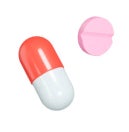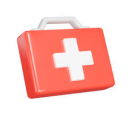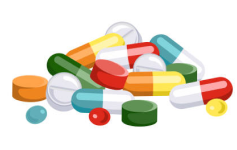Uses
What is Clindamycin for?
Clindamycin is an antibiotic which works by preventing bacterial growth and multiplication. It is commonly used to treat infections involving the skin and soft tissues, bone and joints. It can also be applied on the skin to treat acne.
You can also find out about this medication by watching these videos:
They are available in English, 中文, Melayu and தமிழ்: Clindamycin
How should I take or use Clindamycin?
Oral Clindamycin
- Clindamycin should be taken with or after food together with a full glass of water.
- Complete the course of antibiotics as prescribed by your doctor. Incomplete treatment may cause the infection to recur.
- Do check with your healthcare professional before stopping your medication.
Topical Clindamycin (Gel, Lotion)
- Wash and dry your hands before and after using the medicine.
- Clean and dry the area that you will be applying clindamycin on. Apply a thin layer of the medicine.
- Topical clindamycin is usually applied 1 to 2 times a day. Follow your doctor's instructions.
- Avoid your eyes, nose, mouth and lips when you apply clindamycin on your skin. Wash with water if the medicine gets into any of these areas. Avoid applying onto broken or irritated skin as it can worsen the skin condition.
- It may take up to 3 months to see the effects of this medicine for acne. Do not stop using it even if you do not see results immediately.
What should I do if I forget to take or use Clindamycin?
If you forget to take a dose, take it as soon as you remember. If it is close to the time for your next dose, skip the missed dose and go back to your usual timing. Do not take two doses at the same time to make up for the missed dose.
Precaution
What precautions should I take when taking or using Clindamycin?
Inform your healthcare professional if:
- You are allergic to Clindamycin, Lincomycin or any of the other ingredients of this medication.
- You are pregnant, planning to become pregnant, or breastfeeding. Risks and benefits regarding the use of Clindamycin should be discussed with your doctor.
- You are taking any other medications, including supplements, traditional medications and herbal remedies.
Side Effects
What are some common side effects of Clindamycin?
- Diarrhoea
- Drink plenty of water with oral rehydration salts to replenish your fluids and electrolytes.
- If you experience any of the following severe symptoms, stop taking clindamycin and seek medical advice immediately:
- Develop a fever or experience persistent diarrhoea, abdominal pain
- Very watery or loose stools
- Blood or pus in your stools
- Nausea, vomiting, metallic or unpleasant taste in your mouth
- Take Clindamycin with or after food.
- Heartburn, pain/burning sensation at the back of throat, stomach discomfort
- Take Clindamycin with a full glass of water. Take small but frequent meals, avoid spicy foods.
What are some rare but serious side effects that I need to seek medical advice immediately?
The symptoms of a drug allergy include one or more of the following:
- Swollen face/eyes/lips/tongue
- Difficulty in breathing
- Itchy skin rashes over your whole body
If you experience any of these symptoms, you should stop your medication and see your healthcare professional immediately.
You can also find out about drug allergies by watching these videos:
They are available in English, 中文, Melayu and தமிழ்: Drug Allergies
Very rarely, Clindamycin may injure the liver. Stop this medication and seek medical advice immediately if you develop any of these symptoms:
- Dark-coloured or tea-coloured urine
- Light coloured stools
- Severe abdominal pain, nausea and vomiting
- Loss of appetite
- Yellowing of the skin and eyes
Handling
How should I store Clindamycin?
Store in a cool and dry place, away from direct sunlight. Keep this medication out of reach from children.
How do I throw away Clindamycin safely?
Pack this medication into a black trash bag and seal it tightly before throwing into the rubbish chute or bin.
Disclaimers
If you take more than the recommended dose, please seek medical advice immediately. The information provided on this page does not replace information from your healthcare professional. Please consult your healthcare professional for more information.
This article is jointly developed by members of the National Medication Information workgroup. The workgroup consists of cluster partners (National Healthcare Group, National University Health System and SingHealth), community pharmacies (Guardian, Unity and Watsons) and Pharmaceutical Society of Singapore. The content does not reflect drug availability and supply information in pharmacies and healthcare institutions. You are advised to check with the respective institutions for such information.
Last updated on Jul 2021

Need More Medicine?
Use Medicine Order Service on HealthBuddy.

Medicines Reminder
Get reminders and chart progress on HealthBuddy.



















